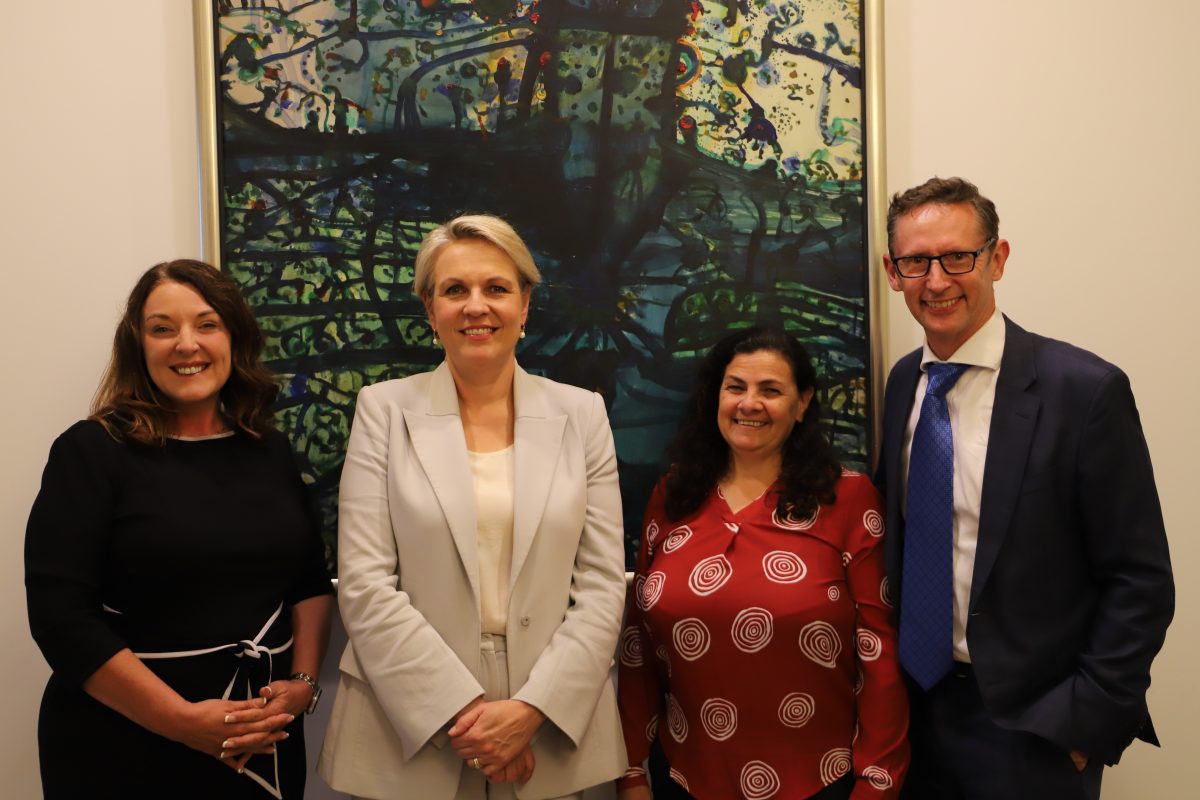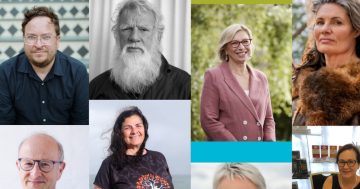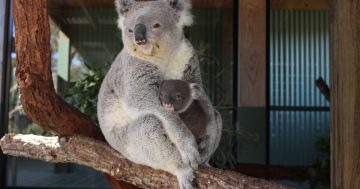
Member for Cunningham Alison Byrnes, Minister for the Environment and Water Tanya Plibersek, Dr Jodi Edwards and Member for Cunningham Stephen Jones at a briefing on the Unbroken Whispers project. Photo: Office for Alison Byrnes.
University of Wollongong researcher Dr Jodi Edwards is ecstatic following the Federal Government’s announcement it will invest more than $300,000 in the study of Indigenous environmental knowledge about the connections between land, sea and sky, with a particular focus on whales.
The funding will support the ‘Unbroken Whispers’ project, led by Dr Edwards.
Unbroken Whispers seeks a better understanding of the long-term migratory patterns, habits and relationships of the vulnerable humpback whale, southern right whale, orcas and dolphins, and looks at how we can use Indigenous knowledge to better protect these species.
“The key outcomes of the project are around the Environment Protection and Biodiversity Conservation Act,” Dr Edwards said.
“Currently, there’s not a strong Indigenous voice in there.
“We want to provide a voice for Aboriginal people who have a connection to cetaceans, to speak about their concerns, their cultural connections, and then for the project itself to use that cultural knowledge to inform protection and recovery of these species.”
A Yuin woman, Dr Edwards has a keen sense of her responsibility as a custodian of Country and culture.
She was spurred to take part in the project after she saw the carcasses of beached whales being dumped in landfill, instead of being returned to the sea.
“People feel so strongly about sustainability – if they understood the stories about our sea kin they would know that carcass has a job to do,” she said.
“We had 14 strandings along the east coast this year that I’m aware of; that’s a lot of meals that were taken away from other ocean animals, and to me the ramifications like increased hunger in sharks, are obvious.
“It’s not only a food source – when the bones float down to the bottom of the ocean it’s the nitrogen that comes off the carcass and creates a Dynamic Lifter for the soils and the sands and helps the seagrass.
“A whole ecological system is impacted because of our fear of increased shark activitiy, where our responsibility should be not to go swimming for a while.
“We need to reawaken the ancient whale stories, songlines and dances, our relational partnership with our sea kin and use that knowledge to ensure their protection, and the protection of sea country, and to pass that down to the next generation and the generation below that.
“Our sea kin don’t have a voice, and I feel like it’s my cultural responsibility to be the voice for the voiceless and help people understand, with permission from different whale custodians along the east coast.”
Responsibility and respect are key pillars of Dr Edwards’ approach to research.
Indigenous knowledge has often been stripped of context and Aboriginal communities have been denied ownership in academic spaces.
Dr Edwards is determined to work with communities along the east coast in a way that respects their right to share as much, or as little, as they feel is right.
“I’m often a little despondent when I read an article where someone [has gone] to a community, been told a story, and promptly written it down and shared it,” she said.
“We have to be very careful inside the research we do that we’re not excluding particular communities, or creating divisions inside the communities we work with.
“The responsibility isn’t just to ask if you can share the story, but in what context you can share the story and who you can share it with.
“Aboriginal communities will have full ownership of this study and they will get to have the final decision on what is released and what is not released to the wider community.
“You couldn’t give me enough money to do this research if that wasn’t going to be the case.”
The project will begin later this year, with the team following whales from Brunee Island further north, before heading back to South Australia, on to Warnambool, Phillip Island and Garie Island.
The research project is partly funded by the Australian Government through the National Environmental Science Program’s Marine and Coastal Hub and will run from 2024 to 2026.














